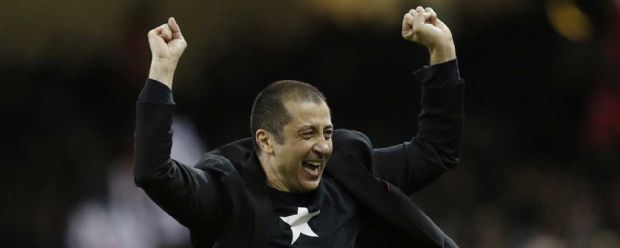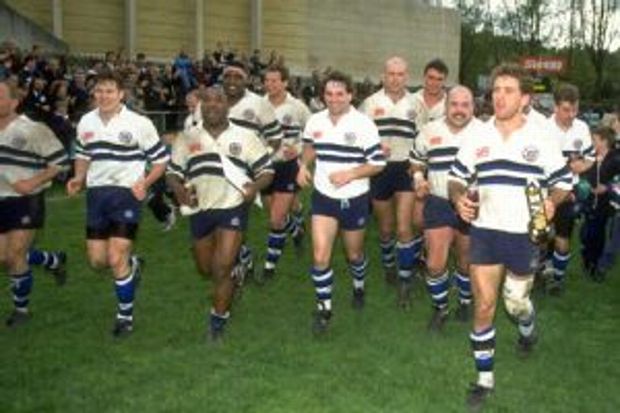|
European Rugby Champions Cup
Are Toulon the greatest ever club side?
Huw Richards
April 30, 2015
 Mourad Boudjellal© AFP PHOTO / ADRIAN DENNIS In American sports you really don't want to be a goat. That's the player whose foul-up costs a vital match. A GOAT, though is a very different matter. The extent to which that can be used without explanation to stand for Greatest Of All Time shows how often such issues are debated. That's not, of course, peculiar to the USA. All sporting cultures debate which players and teams are the greatest. Yet it is an argument which seems oddly absent in club rugby. We argue about the best ever international teams (usual answer: The All Blacks) and players, but have less to say about clubs. There's a reason for that, of course. Club rugby lacks the long-term competitive records which underpin most debates. It is tough to argue without much in the way of factual evidence of trophies and big matches won and lost. Only France, with its venerable championship, has that evidence for more than comparatively recent history. And that's before you get to the countries - the southern trio and Ireland - in which clubs were to a great extent subordinate to state/provincial representative teams. But if there's a debate to be had, we have in our midst a live claimant. Should Toulon become the first ever team to complete a hat-trick of European championships on Saturday, they'd certainly have a serious place in any GOAT conversation. If they can add a second consecutive French title, their case would get still stronger. But it certainly would not go uncontested. And, far more in the spirit of offering suggestions than prescribing an outcome, it is not hard to spot some other contenders. But first a few ground rules. In the absence of meaningful contact, and with those differences in structure, it is hard to draw any comparisons between the two hemispheres - so, with a wistful glance in the direction of the San Isidro team which won 14 consecutive Argentine championships between 1917 and 1930, the best Randwick teams and Ponsonby's great eras in Auckland, we're talking Europe only.
It is also hard to draw many conclusions about the earliest rugby. Newport had four invincible seasons in the 1870s, but that was when rugby was still the game of a small minority - and they were firmly stomped when they met Blackheath. Those early Blackheath teams were very good, but again in the context of a game watched and played by small numbers, and without meaningful competition. And that absence makes English teams before the arrival of the national cup in 1971 tough to assess, with one exception. The Coventry teams of Peter Jackson, Phil Judd and Bert Godwin did have a competitive outlet in their alternative identity as Warwickshire, winning seven county championships in eight seasons between 1958 and 1965. Had there been leagues and cups for clubs it seems reasonable to suggest that they might have matched the records set by Bath in the 1980s and 1990s. And for sheer staying power, Bath take some beating. There were 10 national cup wins between 1984 and 1996 and, once the leagues had come in, six league titles in eight years. But just as Coventry were denied competition, Bath - although they played the odd challenge match - could not compete with the best of Europe until very late in their run. Their 1998 Heineken win came as coda rather than climax to their golden age. Leicester, on the other hand, had and took the full range of opportunities. A four season run incorporating four English titles, consecutive Heinekens and a strong role in the brilliant England teams of the time makes the Turn of the Century Tigers extremely strong contenders by any standard. The slightly later Wasps team were supreme winners of big matches - which is one test of greatness - but perhaps lacked the relentless consistency of the Tigers and Toulon. In France, national championship results make it clear that the Stade Bordelais team of the early 1900s were the first true greats, playing in 12 out of 13 finals from 1899 and winning six out of eight between 1904 and 1911 before being brought down by being slightly too enthusiastic in offering off-field inducements to potential talent - advertising in the Scottish press was spectacularly dumb. There is little doubt which is Europe's greatest club over time. Toulouse echo the New York Yankees in baseball. Other clubs have one great hegemonic era. They have several. There are the five French titles in six in the 1920s, six in eight from 1994 and those four Heinekens, albeit spread over 14 years and only that of 1996 paired with a national title. If any of those teams, or Toulon, are to be considered the greatest ever French teams they must beat off two hegemons reflecting different aspects of the national style - the dazzling Jean Prat-inspired Lourdes teams who won six titles between 1952 and 1960 and the Beziers steamroller which flattened most opposition in an intriguingly cadenced run - five sets of two, each separated by a season off - of 10 wins between 1971 and 1984.  Bath Rugby© Mike Hewit/Allsport While Wales resisted national competitions even longer than England a close-knit club system in which the best played each other regularly left a clear idea of hierarchies and enabled the annual identification of an unofficial champion. In this context Swansea's six titles out of seven between 1899 and 1905, a period in which they won 194 matches and lost 13, nearly beat the first All Blacks, fuelled the first Welsh golden age and fielded the two players - Bill Bancroft and Dicky Owen - who held the game's all-time caps record from 1900 to 1928, look pretty formidable. On player asked about their defensive qualities said : "I don't know. I only joined two years ago and we've been attacking all that time." But that has to be measured against Bleddyn Williams-era Cardiff who between 1947 and 1955 won four unofficial titles, pulled in unprecedented crowds and beat the Wallabies, the Springboks and the All Blacks, Llanelli's four-in-a-row cup winners (and All Black beaters) of the 1970s and the fearsome Pontypool teams of the 1980s, who would certainly contest a scariest-of-all-time final against Beziers. And has any club team made more of an impact on the wider game than John Dawes' 60/70s London Welsh, the first to fully exploit the liberating rule changes of the period, sparking the second Welsh golden age and providing seven players to the only modern Lions team to have won in New Zealand ? That no Welsh team from the professional era remotely contends tells its own tale. For a Scottish contender we need look no further Hawick, who play at the only rugby ground which shares its name with a Jane Austen novel and won 10 of the first 14 Scottish league titles. Ireland raises the 'what is a club ?' question. If provinces are excluded, we must look to Shannon's eight all-Ireland titles in 12 seasons from 1994. If they're in, Leinster's three Heinekens in four edge out historic Ulster powerhouses and Munster's extraordinary consistency in Europe. So who wins? That's your choice, with plenty of scope for debate and dissension. A personal shortlist might well include Dicky Owen's Swansea, Jean Prat's Lourdes and the Turn of the Century Tigers. But on another day, it would be hard not to be persuaded by the counterclaims of Bleddyn's Cardiff, Jack Rowell's Bath and the Beziers machine. The game has changed so much over time, and that lack of continuity in both rules and competitive structures (or the lack of them) makes comparisons tricky. But there are some points of certainty. Greatness is rare, but we can recognise it in any era. And if Toulon carry off a third consecutive European crown on Saturday they'll have fully earned the right to be compared with any team in this list. © Huw Richards
|
Live Sports
Communication error please reload the page.
-
Football
-
Cricket
-
Rugby
-
- Days
- Hrs
- Mins
- Secs
F1 - Abu Dhabi GP
Abu Dhabi Grand Prix December 11-131. Max Verstappen ()
2. Valtteri Bottas (Mercedes)
3. Lewis Hamilton (Mercedes)
4. Alexander Albon ()
5. Lando Norris ()
6. Carlos Sainz Jr ()
-
ESPNOtherLive >>
Golf - Houston Open
Snooker - China Open
Tennis - Miami Open

